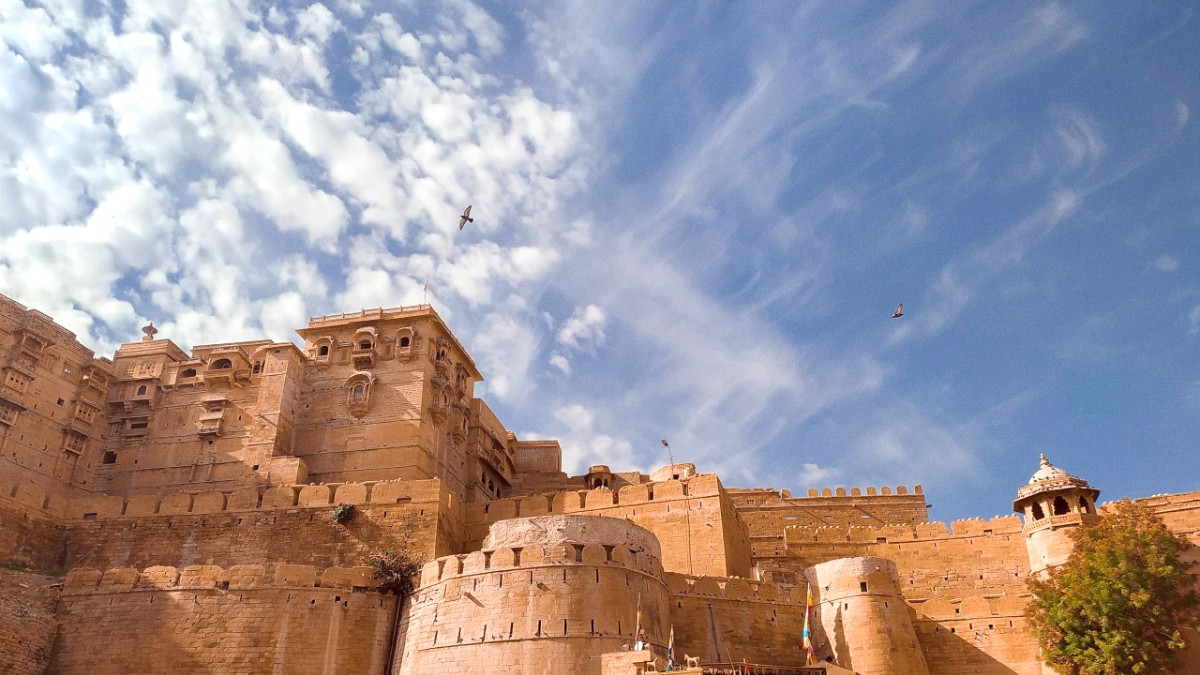
Rajasthan, India
Jaisalmer experiences distinct climate patterns throughout the year.
Each period offers distinct benefits and considerations for visitors.
October to March
Ideal weather for sightseeing and desert activities. The Jaisalmer Desert Festival often falls within this period.
Prices for accommodation and tours are higher. Expect larger crowds. Booking far in advance is advised.
April & September
Fewer tourists, lower accommodation prices. Skies often remain clear.
Temperatures begin to rise significantly in April and stay high in September. Outdoor activities face limitations due to heat. Daytime sightseeing needs early starts.
May to August
Lowest prices for accommodation and tours. Few tourists, a quiet experience. Experience the desert at this time for an unique perspective.
Extremely hot temperatures make daytime exploration difficult. Many businesses operate with reduced hours or close. Camel safari options are limited.
Summers are intensely hot with strong sun. Carry water always. Seek shade during peak heat hours. Occasional dust storms occur, notably in pre-monsoon and post-monsoon periods. These reduce visibility and air quality. Carry a Scarf or mask. Winter nights, especially in the desert, become quite cold. Pack warm layers to stay comfortable.
The period from October to March offers the best conditions for camel safaris and desert camping. The milder temperatures make prolonged outdoor time enjoyable. For fort and haveli sightseeing, during high season, mornings or late afternoons are comfortable. In shoulder and low seasons, plan visits for very early morning or late evening to avoid the intense midday heat.
Best during October to March. Milder temperatures make prolonged outdoor time enjoyable.
Mornings or late afternoons for comfort.
Plan visits for very early morning or late evening to avoid midday heat.
Always carry Water. Seek shade during peak heat. Limit strenuous outdoor activity.
Travelers to India generally need a visa. Prepare documents carefully to avoid delays.
India offers various visa types for different purposes. Select the one that matches your travel plans.
Gather these documents carefully to ensure a smooth entry into India.
Jaisalmer offers options for various budgets.
The local currency is the Indian Rupee (INR). Exchange rates fluctuate. As of late 2023/early 2024, approximately 1 USD equals 83 INR.
These figures are approximate and vary based on spending habits. Jaisalmer caters to diverse travel budgets.
Implement these strategies to manage your travel budget in Jaisalmer effectively.
Understand common concerns and how to prevent them for a safe Jaisalmer trip.
Consult a healthcare professional well in advance of travel, ideally 4-6 weeks before your trip, for personalized advice.
A Yellow Fever vaccination certificate is required only if you arrive from a country with a risk of Yellow Fever transmission.
Common recommendations include Hepatitis A and B, Typhoid, Tetanus, Diphtheria, and Pertussis (Tdap), Measles, Mumps, Rubella (MMR).
Traveler's diarrhea is the most common health issue for visitors.
Prevent it by drinking only bottled or purified water. Avoid ice, raw fruits, and vegetables you have not peeled yourself. Exercise caution with street food unless it looks visibly hygienic and is cooked fresh in front of you. Carry Imodium A-D Caplets for quick relief.
Dehydration & Heatstroke risk is especially high in summer. Drink plenty of fluids like water, fresh lime soda, or buttermilk. Stay in the shade during peak heat hours (midday). Mosquito-borne diseases like Dengue fever and Chikungunya are present; use Insect repellent, wear long sleeves and pants.
Consider a Sawyer Products Permethrin Insect Repellent for treating clothing.
Drink only sealed Bottled water, filtered water, or water purified using a device. Avoid tap water and ice made from tap water, even for brushing teeth. A LifeStraw Go Water Filter Bottle offers a sustainable way to purify water.
Eat hot, freshly cooked food. Avoid salads or peeled fruits from street vendors unless hygienically prepared. Opt for popular eateries with high turnover, where food does not sit out for long.
Jaisalmer has government hospitals and private clinics. For serious medical emergencies, transfer to a larger city like Jodhpur or Jaipur may be needed for advanced facilities. Pharmacies are readily available for basic medications.
Jaisalmer is generally considered safe for tourists, with a low crime rate. Nevertheless, awareness is always advised.
Awareness of the desert environment helps prepare for potential hazards.
Occasional dust storms occur during dry seasons. They reduce visibility and air quality. Seek shelter indoors during these events. A Dust mask or bandana is useful.
The major hazard in summer, leading to dehydration or heatstroke. Plan activities for cooler parts of the day and stay hydrated. Use High SPF sunscreen, a Wide-brimmed hat, and sunglasses.
The UV index is high. Protect your skin. Wear long sleeves and pants, even in heat, to protect from intense sun exposure. EltaMD UV Clear Broad-Spectrum SPF 46 provides good protection.
Keep your hotel's number and address handy. Know the contact details for your country's embassy or nearest consulate in India (likely Delhi or Mumbai) for serious issues like lost passports.